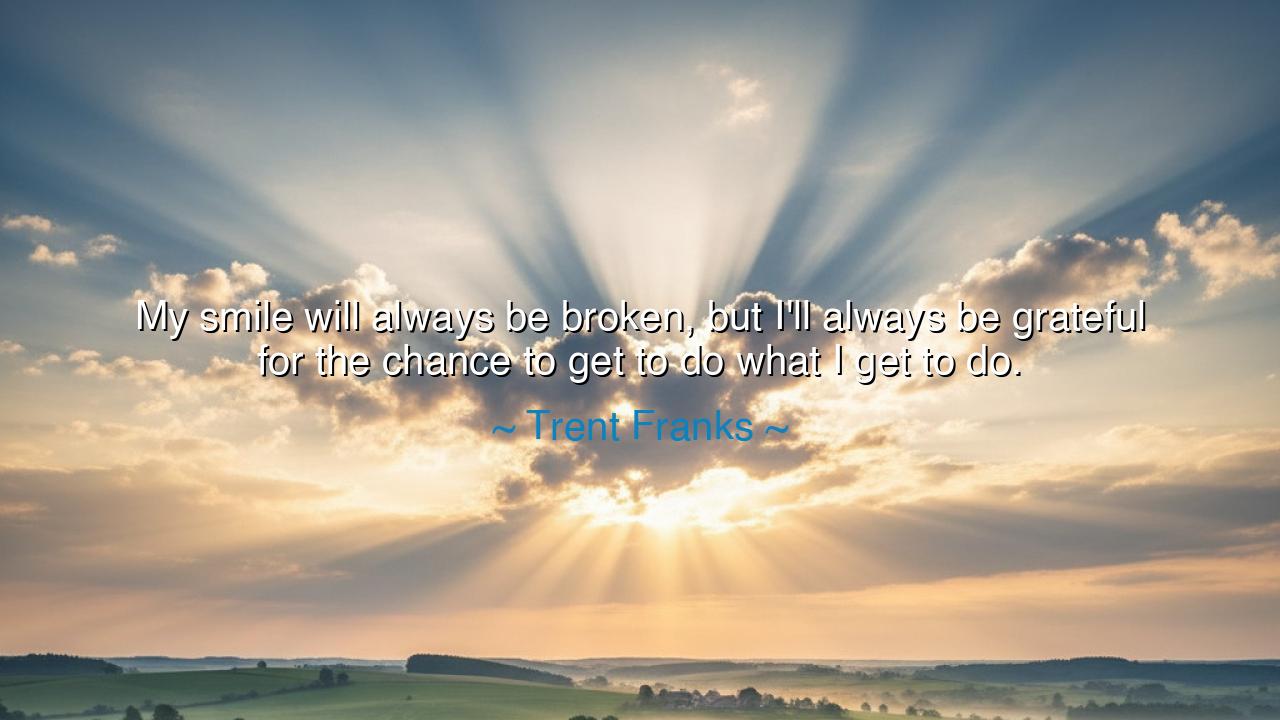
My smile will always be broken, but I'll always be grateful for
My smile will always be broken, but I'll always be grateful for the chance to get to do what I get to do.






Hear the words of Trent Franks: “My smile will always be broken, but I’ll always be grateful for the chance to get to do what I get to do.” These words, filled with both sorrow and strength, speak to the paradox of the human journey: that even in brokenness, gratitude can dwell. The smile, a symbol of joy and light, here bears the mark of imperfection—broken, incomplete, scarred by trial or loss. Yet Franks reminds us that gratitude transcends appearance, that the soul’s radiance can shine even through fracture, and that the gift of purpose outweighs the shadow of pain.
The ancients understood this balance of sorrow and gratitude. The poet Aeschylus wrote that “through suffering comes wisdom,” and that even wounds may bear gifts unseen at the moment of pain. A broken smile is not only a mark of loss but also of survival, of having endured life’s harshness and yet still finding reason to give thanks. The words are a testament to resilience, declaring that though beauty may be marred, the spirit can remain full of light and purpose.
History offers us many such examples. Consider Franklin Delano Roosevelt, whose body was broken by polio. His gait was forever altered, his frame weakened, but his resolve grew strong. He might have lamented his condition, but instead he embraced his role with gratitude, declaring that life had still granted him the chance to lead. His smile, too, was strained by illness, but it became a beacon of courage to a nation ravaged by depression and war. Like Franks, he knew that the outward mark of brokenness did not diminish the inward flame of service.
In Franks’ words, there is also humility. He acknowledges imperfection openly: “My smile will always be broken.” There is no attempt to hide or to deny. Yet he immediately follows with gratitude: “I’ll always be grateful for the chance…” This contrast is powerful, for it shows that true strength lies not in perfection, but in the ability to embrace imperfection while still cherishing the blessings of life. Such an outlook transforms despair into wisdom and hardship into testimony.
The smile, then, becomes a metaphor for life itself. Few pass through this world unbroken; most carry scars, whether on the body, the face, or the heart. But the brokenness does not define us unless we allow it to. What defines us is our response—whether bitterness or gratitude, whether despair or hope. By choosing gratitude, as Franks proclaims, we affirm life even in the midst of struggle. We declare that the opportunity to serve, to create, to live, outweighs the weight of imperfection.
The lesson here is clear: do not wait for perfection to begin living with joy and gratitude. Acknowledge your scars, your broken smile, your incomplete places—but do not let them silence your purpose. Instead, let them remind you of the gift of endurance, of the strength that emerges from trial. Choose gratitude each day, for even in brokenness, life offers the chance to do good, to fulfill a calling, to shine despite the cracks.
So let this wisdom endure: life may break the smile, but it cannot break the spirit that is anchored in gratitude. Accept the fractures of your journey, and still give thanks for the chance to walk it. For in the end, it is not the perfection of the smile that matters, but the depth of the heart behind it. And a broken smile, offered in gratitude, may hold more beauty than the flawless mask of one untouched by struggle.






AAdministratorAdministrator
Welcome, honored guests. Please leave a comment, we will respond soon